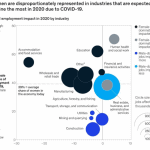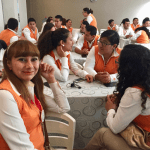The Blind Spot in Africa’s COVID-19 Response: Western Public Health Tactics Won’t Work – This Local Solution Might
With more than 66,373 COVID-19 cases and 2,336 deaths reported in 53 African countries, and minimal testing available, the pandemic is primed to spread. Predictions of its impact are dire. With just one doctor per 5,000 people in sub-Saharan Africa and about one nurse or midwife per 1,000 people, a major outbreak would quickly overwhelm the continent’s health care systems.
What’s more, containment of COVID-19 would be impossible in the African context. Western tactics to stop the virus, such as hand washing and social distancing, will not work in crowded slums or areas without ready access to clean water or soap.
But where Western methods may fall short, Africa can depend on its own solutions. African countries have relied on community health workers (CHWs) – local people trained to deliver basic health services to their own communities – to successfully tackle other major epidemics, including HIV and Ebola. To reduce the impact of COVID-19, Africa must rapidly scale up the recruitment and training of CHWs, enlisting young people, teachers and faith leaders to educate the public about prevention, identify cases in their communities and help stop transmission.
Community Health Workers: Need and Opportunity
Some countries, led by South Africa, have already begun to do so. There, over 28,000 health care workers are going door to door, screening for COVID-19 in nine provinces nationwide. They are noting travel histories, taking temperatures and assessing other risk factors. When warranted, they recommend testing — which is the necessary companion to widespread screening by CHWs. Liberia, Uganda and Malawi have also begun to deploy CHWs in their fights against the virus.
However, much more is needed, as CHW programs are severely understaffed – especially in the context of a pandemic. But this need raises an opportunity: By scaling up funding for the recruitment and training of additional CHWs, governments can generate employment for young people – a population that has both a unique need, and a unique ability, to contribute to this effort.
African youth under age 15 constitute over 40% of the total population in Africa (compared to 18% in North America and 16% in Europe). Millions of young people across the continent are enrolled in public secondary schools, and many more receive religious schooling or belong to a church congregation. Now, as most schools are closed and unemployment is soaring, many young people would be eager to gain new job skills and join national COVID-19 prevention campaigns.
To accomplish this goal, ministries of education and of health will have to work quickly, and in a coordinated fashion. They should collaborate to develop digital tools for training CHWs, initially focused on communicating core messages about combating the spread of infection. Ministry staff should also work with district health officials and their partners to “train the trainers” – teachers and faith leaders. These leaders can then connect with students (age 15 and older) to train them using mobile devices. Governments and telecommunication companies should further collaborate to provide free airtime and internet access, enabling training and information dissemination by CHWs to local communities.
At the same time, government COVID-19 response plans should include measures that close the gaps between countries’ health and educational systems, integrating the practical health skills of CHWs into school curricula. Such training should ultimately become as routine as a school safety drill, as COVID-19 will surely not be the last health crisis the continent will face. Expanding the CHW health corps today will enable countries to maximize their response to public health threats in the future.
Empowering young people with science-based health information will also have an impact on the communities around them. With illiteracy still impacting 40% of the population in sub-Saharan African, older family members often rely on their children to understand written public health messages. And with myths and misconceptions about COVID-19 running high, young people can be a major conduit of accurate information, reaching nearly every household, and combating the massive misinformation that is now hindering Africa’s pandemic response.
Informing Communities to Fight the Pandemic
Some may fear that training young people as health workers in the midst of a pandemic may put them at risk. In fact, the opposite is true. Arming them with complete and accurate information is one of the most crucial strategies for stopping the pandemic in Africa. Informed communities are in the best position to apply principles of public health to their unique circumstances.
Prior experience shows that grounding public health strategies in local realities makes success possible. For example, in early 2000, my team and I at Partners in Health improved pregnant women’s use of health services in Rwanda’s Eastern Province from 15% to 75% within a few months. Partners in Health trains health care workers and leaders and treats patients in some of the most marginalized communities in the world, and uses that experience to strengthen public health systems that support those most in need. The key to our success in Rwanda was simple: We located health centers next to local markets and aligned health service delivery days with market days. Our awareness of the unique local context allowed us to make these vital services convenient for women to access as part of their weekly routine.
Similar approaches can be applied to scaling community health worker programs. Indeed, the model has already been tested on a broader scale, as the use of locally trained CHWs has helped curtail HIV, Ebola and malaria in countries across the continent. In the Democratic Republic of Congo, for example, the government and UNICEF worked with 2,500 teachers to educate their 33,000 students about Ebola prevention and protection. Although not full-fledged CHWs, the students were able to take that public health information to their families, accelerating control of Ebola across the country.
Today, as global health experts and African countries ramp up their response to the novel coronavirus, they must build on Africa’s values and resources. Armed with knowledge, youth will provide a frontline of health defense for their families and communities. Integrating the health and education systems and investing in youth and their teachers will do far more to stop the pandemic than simply replicating Western public health solutions.
Anatole Manzi is Deputy Chief Medical Officer at Partners In Health and an assistant professor at University of Global Health Equity.
Photo courtesy of CDC Global.
- Categories
- Coronavirus, Health Care
- Tags
- COVID-19, public health



